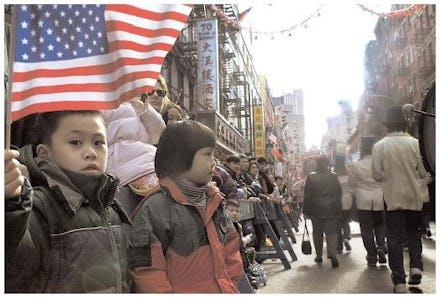California Just Took a Major Step to Fix One of America's Most Racist Mistakes

The news: It's about time.
After 71 years, the state of California has finally decided to finally make amends for one of the more horrific chapters in American legislative history.
The Chinese Exclusion Act, passed by President Chester A. Arthur in 1882, was the first federal law to exclude a group of immigrants based solely on their race or nationality. Although it was repealed in 1943, its devastating impact on generations of families cannot be overstated.
That's why last Thursday was such an important victory: After a unanimous vote, the California State Senate decided to urge Congress to issue a formal public apology for the racist legislation.
But is America sorry? If 2012 is any indicator, maybe a little bit. That's when Congress passed the Resolution of Regret, otherwise known as the governmental equivalent of, "I'm sorry your feelings got hurt."
According to California State Sen. Bob Huff (R.), this simply doesn't pass muster: "An expression of 'regret' is different from an actual apology," he said. "Regret is ambiguous and may or may not imply guilt. An apology is clear, expressing both regret and responsibility."
Betty Tom Chu, former mayor of the Los Angeles suburb of Monterey Park, also stated, "An apology is a sincere expression of accepting responsibility for doing something wrong. That our government can boldly admit and make a declaration of apology is what makes this country so great. We are a stronger nation when we accept responsibility for acts of discrimination."
The history: Time will tell if they actually do it, but the vote alone is a step toward rectifying this little-known chapter that still casts a dark shadow over the Chinese-American experience.
When the first big wave of Chinese immigrants came to the U.S. during the California Gold Rush, resources were plentiful and white hostility was limited. That changed quickly: As gold reserves were depleted, the Chinese were increasingly seen as competition. Even while Chinese workers toiled as railroad laborers and settled in cities like San Francisco, popular animosity towards them grew.
The fervor gained momentum in the 1870s, when California adopted a new constitution permitting the state to decide who was allowed to reside there. Guess who got the shaft? Not only did the measure institutionalize anti-Chinese sentiment, it also facilitated a statewide ban on employing them.
Then came 1882. When the Exclusion Act passed on a federal level, it classified Chinese immigrants as a danger to the public good. The government subsequently banned "skilled or unskilled" Chinese laborers from immigrating under penalty of imprisonment or deportation, and permanently excluded current workers from their rights to citizenship.
Families were divided and lives were ruined. Relations between the U.S. and China were irrevocably soured. It wasn't until 1943, when China became a wartime ally against Japan, Germany and Italy, that the act was finally repealed.
What now? Though the Apology for the Chinese Exclusion Act, or SJR23, has gained momentum on the California Senate floor, the State Assembly still has to approve it before submission to Congress. But for now, members of the grassroots committee that prompted the measure are in high spirits: "Today is a victory for our democratic process by reaffirming our government's commitment to protecting the civil rights of all of us — and not excluding anyone on account of race or ethnic origin," Apology for the Chinese Exclusion Act Committee member Sophie C. Wong said.
The next steps aren't etched in stone, but hopefully Congress issues the apology without any resistance. They've already done it for Japanese-Americans, Native Hawaiians and American Indians, to name a few.
It's time Chinese-Americans got some recognition as well.